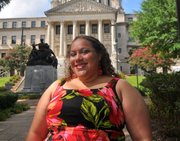As I commemorated the 50th anniversary of the March on Washington, I thought about the Dr. Martin Luther King Jr. we rarely hear about. We have allowed people to define King with one speech: "I Have a Dream."
The speech was important and powerful. When I was a young girl, I copied the whole speech and carried it every day. But Dr. King issued many challenges to Americans that we remain silent about. In a lesser-known speech, "Remaining Awake Through a Great Revolution," King said it was time to develop a world perspective, stating: "The world in which we live is geographically one. The challenge that we face today is to make it one in terms of brotherhood."
Instead of the warm, fuzzy, let's-all-hold-hands-and-everything-will-be-fine Dr. King that some have led us to believe existed, he understood that racism is complex and woven into our nation's fabric.
"It is an unhappy truth that racism is a way of life for the vast majority of white Americans, spoken and unspoken, acknowledged and denied, subtle and sometimes not so subtle—the disease of racism permeates and poisons a whole body politic," King said. "And I can see nothing more urgent than for America to work passionately and unrelentingly—to get rid of the disease of racism."
This is the same speech in which he famously called Sunday mornings "the most segregated hour" in America. That hasn't changed much.
King also spoke about the myths around race and race relations that are hindering our progress. The first myth he called out is still with us, too: "One is the myth of time. It is the notion that only time can solve the problem of racial injustice. And there are those who often sincerely say to the Negro and his allies in the white community, 'Why don't you slow up? Stop pushing things so fast. Only time can solve the problem. And if you will just be nice and patient and continue to pray, in 100 or 200 years, the problem will work itself out.'"
One moment in time should never define someone. Many prefer Dr. King, the dreamer. People don't want to know about the Poor People's Campaign that he was working on when he was assassinated or his anti-war views. The American public doesn't want to hear any so-called radical or militant words from a black leader they have decided is "safe" on race relations, so Dr. King's message has to be edited, refined and repackaged for easy mass consumption.
It's OK to have a dream—just make sure you're awake for the revolution.



Comments